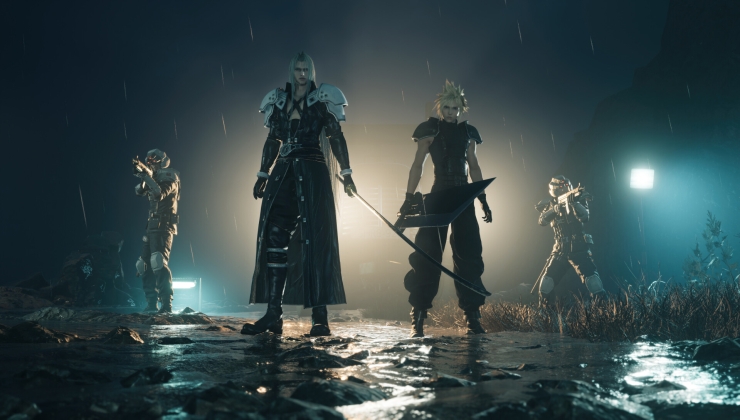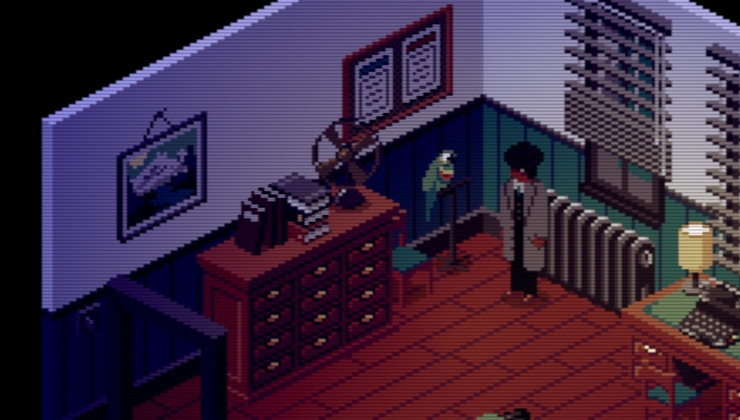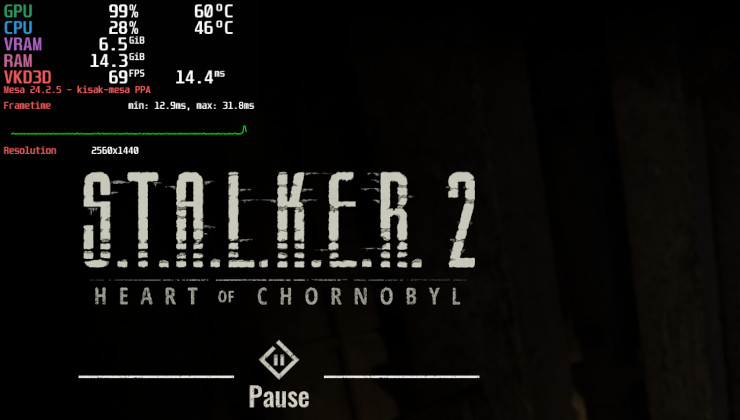Here's a very interesting development for the world of the open source Godot Engine, as a new company named W4 Games has been formed to push it further than ever before. Founded by Godot Engine veterans Juan Linietsky, Rémi Verschelde and Fabio Alessandrelli, and veteran entrepreneur Nicola Farronato the idea is to provide commercial assistance to developers of all sorts using Godot Engine.
One of the goals (there will be a number) is to help developers access console markets, which has been a problem for Godot Engine since it's fully open source and can't just include everything needed to publish on consoles as they've historically been restrictive with things like their SDK. So one goal of W4 Games is to help there, as their FAQ mentions:
W4 was created to satisfy commercial needs of the corporate game industry that are currently unaddressed, by providing products and services to companies that need them in order to move to Godot from other technologies. This includes services offering such as enterprise support plans and the possibility to access markets that were previously unreached by Godot, such as console platforms. Stay tuned for more details!
That's just one small part of it though, as their announcement explains:
W4 Games was formed to strengthen the Godot ecosystem by providing both enterprise and independent developers with a complementary suite of commercial products and services to successfully develop and publish video games to all existing platforms in the market. Further announcements about these products and services will be made over the coming weeks and months as they become available.
For anyone suddenly worried — Godot Engine remains community built, owned and run and will continue to be. This is just a few of their team hoping to keep pushing open source to the masses of developers out there.
Very much Red Hat style.
Love they approach they are taking. <3Even their FAQ says so!
Very much Red Hat style.
Are other successful commercial open source companies using a similar philosophy?
Yes, W4 is deeply inspired by the original Red Hat business model. This model consists in providing commercial services to complement and support a fully free and open source ecosystem. That open source ecosystem stays independent and strives from the contributions of multiple commercial actors.
Even their FAQ says so!Just to put things into perspective, that business model isn't exactly original to Red Hat; it's basically dictated by the GNU license of the kernel and the GNU toolchain. That quote just makes it sound like Red Hat invented it, which definitely isn't the case.
Are other successful commercial open source companies using a similar philosophy?
Yes, W4 is deeply inspired by the original Red Hat business model. This model consists in providing commercial services to complement and support a fully free and open source ecosystem. That open source ecosystem stays independent and strives from the contributions of multiple commercial actors.
EDITed after jumping over to read the actual FAQ:
Throughout the development of our products we will be open sourcing as much as we can, including additions to Godot that strengthen the engine.And there you have it... "as much as we can", as opposed to "everything because we have to". Marketing speech and business as usual.
Last edited by Valck on 9 Aug 2022 at 5:04 pm UTC
Even their FAQ says so!Just to put things into perspective, that business model isn't exactly original to Red Hat; it's basically dictated by the GNU license of the kernel and the GNU toolchain. That quote just makes it sound like Red Hat invented it, which definitely isn't the case.
Are other successful commercial open source companies using a similar philosophy?
Yes, W4 is deeply inspired by the original Red Hat business model. This model consists in providing commercial services to complement and support a fully free and open source ecosystem. That open source ecosystem stays independent and strives from the contributions of multiple commercial actors.
I do respect thatthey(promise to)say they take the same approach, even though Godot is licensed under the much more "permissive" MIT license that theoretically wouldn't require them to give back any changes they make.
EDITed after jumping over to read the actual FAQ:
Throughout the development of our products we will be open sourcing as much as we can, including additions to Godot that strengthen the engine.And there you have it... "as much as we can", as opposed to "everything because we have to". Marketing speech and business as usual.
They will port games to consoles and that means NDAs, license issues and so on. They can't just add a PS5/Switch export to the engine, Sony/Nintendo would probably sue them and win.
What they MIGHT do is build the engine so the last step after users get a license from console manufacturers is as easy as possible ... that's a different story.
They made a very informative blogpost about that issue: https://godotengine.org/article/godot-consoles-all-you-need-know
They are obviously not the first company that will offer professional porting to consoles and it's great that such companies exist. Maybe they can even offer the necessary code to the console manufacturers, so these can include them in their SDK (I think that is what Unity did)
Otherwise, I'd trust these people to contribute back. Considering what they did for Godot so far, they are really underpaid.
Last edited by const on 9 Aug 2022 at 5:23 pm UTC
EDITed after jumping over to read the actual FAQ:
Throughout the development of our products we will be open sourcing as much as we can, including additions to Godot that strengthen the engine.And there you have it... "as much as we can", as opposed to "everything because we have to". Marketing speech and business as usual.
Well, if they work on proprietary stuff to allow games to run on consoles, they simply CAN'T upstream -everything- just...as much as they can?
Not sure if you read evil intent into their words when there isn't any? At least I don't think they are going to last in this business for very long if they build a reputation for exploiting the open source engine their business is based on, without giving back.
"Incorporated in Dublin" – all the power to the Irish people, but Ireland is well known as Europe's tax haven par excellence – coupled with investment capital (in itself a big red flag) from "a leading investment fund in Open Source Software" and "a Silicon Valley giant" which doesn't help to make it sound any better.
Spoiler, click me
Ireland ranks among the top ten wealthiest countries in the world in terms of GDP per capita, although this has been partially ascribed to distortions caused by the tax inversion practices of various multinationals operating in Ireland.
"We want to help the video game industry reclaim their control on the technology powering their games"
Wait what? Who exactly are we talking about? The video game industry that is just about beginning to lose the tiniest bit control of their grip on the technology because of independent studios and engines like Godot, neither of which ever lost control over their technology because they develop it?
"both enterprise and independent developers can use the community-developed Godot platform with peace of mind" – which independent developers always could; just the suits in the marketing department weren't at ease with, so that is what this is all about?
Certainly a company to keep our eyes on.
Even their FAQ says so!Just to put things into perspective, that business model isn't exactly original to Red Hat; it's basically dictated by the GNU license of the kernel and the GNU toolchain. That quote just makes it sound like Red Hat invented it, which definitely isn't the case.
Are other successful commercial open source companies using a similar philosophy?
Yes, W4 is deeply inspired by the original Red Hat business model. This model consists in providing commercial services to complement and support a fully free and open source ecosystem. That open source ecosystem stays independent and strives from the contributions of multiple commercial actors.
I do respect thatthey(promise to)say they take the same approach, even though Godot is licensed under the much more "permissive" MIT license that theoretically wouldn't require them to give back any changes they make.
EDITed after jumping over to read the actual FAQ:
Throughout the development of our products we will be open sourcing as much as we can, including additions to Godot that strengthen the engine.And there you have it... "as much as we can", as opposed to "everything because we have to". Marketing speech and business as usual.
They will port games to consoles and that means NDAs, license issues and so on. They can't just add a PS5/Switch export to the engine, Sony/Nintendo would probably sue them and win.
What they MIGHT do is build the engine so the last step after users get a license from console manufacturers is as easy as possible ... that's a different story.
They made a very informative blogpost about that issue: https://godotengine.org/article/godot-consoles-all-you-need-know
They are obviously not the first company that will offer professional porting to consoles and it's great that such companies exist. Maybe they can even offer the necessary code to the console manufacturers, so these can include them in their SDK (I think that is what Unity did)
Otherwise, I'd trust these people to contribute back. Considering what they did for Godot so far, they are really underpaid.
"Unfortunately, consoles are entirely closed ecosystems. This means that there is a very simple rule that must be followed in order to develop for them: Unless you sign an NDA (Non Disclosure Agreement) and the manufacturer approves you, it is impossible for you to obtain any kind of information in regards to how they work (and much less publish games)."Which looks like it is about to change with the Steam Deck and other, independent (gasp), consoles – and by the looks of it, "the video game industry" is already up in arms.
I freely admit wihout shame that I haven't been following them and what they have done before founding this company, and maybe I'm doing them injustice; I sure hope you all are right and I am wrong.
Even their FAQ says so!Just to put things into perspective, that business model isn't exactly original to Red Hat; it's basically dictated by the GNU license of the kernel and the GNU toolchain. That quote just makes it sound like Red Hat invented it, which definitely isn't the case.
Are other successful commercial open source companies using a similar philosophy?
Yes, W4 is deeply inspired by the original Red Hat business model. This model consists in providing commercial services to complement and support a fully free and open source ecosystem. That open source ecosystem stays independent and strives from the contributions of multiple commercial actors.
I do respect thatthey(promise to)say they take the same approach, even though Godot is licensed under the much more "permissive" MIT license that theoretically wouldn't require them to give back any changes they make.
EDITed after jumping over to read the actual FAQ:
Throughout the development of our products we will be open sourcing as much as we can, including additions to Godot that strengthen the engine.And there you have it... "as much as we can", as opposed to "everything because we have to". Marketing speech and business as usual.
They will port games to consoles and that means NDAs, license issues and so on. They can't just add a PS5/Switch export to the engine, Sony/Nintendo would probably sue them and win.
What they MIGHT do is build the engine so the last step after users get a license from console manufacturers is as easy as possible ... that's a different story.
They made a very informative blogpost about that issue: https://godotengine.org/article/godot-consoles-all-you-need-know
They are obviously not the first company that will offer professional porting to consoles and it's great that such companies exist. Maybe they can even offer the necessary code to the console manufacturers, so these can include them in their SDK (I think that is what Unity did)
Otherwise, I'd trust these people to contribute back. Considering what they did for Godot so far, they are really underpaid.
"Unfortunately, consoles are entirely closed ecosystems. This means that there is a very simple rule that must be followed in order to develop for them: Unless you sign an NDA (Non Disclosure Agreement) and the manufacturer approves you, it is impossible for you to obtain any kind of information in regards to how they work (and much less publish games)."Which looks like it is about to change with the Steam Deck and other, independent (gasp), consoles – and by the looks of it, "the video game industry" is already up in arms.
I freely admit wihout shame that I haven't been following them and what they have done before founding this company, and maybe I'm doing them injustice; I sure hope you all are right and I am wrong.
There is no sign whatsoever that Sony/MS/Nintendo will open up their walled gardens. SteamDeck surely is important and awesome, my favorite piece of technology since ages, yet it's still a long way for it to pressure these companys.
As an open source advocate and hobby game developer, I can't emphasize enough how important godot is. MIT was the correct license choice and the core developers clearly aren't in it for the money.
Last edited by const on 9 Aug 2022 at 5:47 pm UTC
Well, if they work on proprietary stuff to allow games to run on consoles, they simply CAN'T upstream -everything- just...as much as they can?Specifically "the video game industry" has a reputation for exploiting technology, exploiting artists, exploiting developers, whenever, wherever, and however they can. What we "consumers" think – and so much less we Linux users, fraction of a market share of consumers – has never stopped "the video game industry", at best it might have given them a short second to pause, before they get the spin doctors spinning in the right direction again.
Not sure if you read evil intent into their words when there isn't any? At least I don't think they are going to last in this business for very long if they build a reputation for exploiting the open source engine their business is based on, without giving back.
Again, I hope I read evil intent where there is none, but I'm all too wary of the long and strong arm of the industry we're talking about. This is not about indie studios or small companies; they already don't need this company's help.
As an open source advocate and hobby game developer, I can't emphasize enough how important godot is. MIT was the correct license choice and the core developers clearly aren't in it for the money.No one is denying that, but this isn't about the developers of Godot.
Well, if they work on proprietary stuff to allow games to run on consoles, they simply CAN'T upstream -everything- just...as much as they can?Specifically "the video game industry" has a reputation for exploiting technology, exploiting artists, exploiting developers, whenever, wherever, and however they can. What we "consumers" think – and so much less we Linux users, fraction of a market share of consumers – has never stopped "the video game industry", at best it might have given them a short second to pause, before they get the spin doctors spinning in the right direction again.
Not sure if you read evil intent into their words when there isn't any? At least I don't think they are going to last in this business for very long if they build a reputation for exploiting the open source engine their business is based on, without giving back.
Again, I hope I read evil intent where there is none, but I'm all too wary of the long and strong arm of the industry we're talking about. This is not about indie studios or small companies; they already don't need this company's help.
Exploitism is hardly their fault, no idea why you would imply that.
They certainly use a more inclusive definition of "video game industry" then you.
AAA studios are hardly their target. Read the article about porting I linked.
Last edited by const on 9 Aug 2022 at 5:52 pm UTC
As an open source advocate and hobby game developer, I can't emphasize enough how important godot is. MIT was the correct license choice and the core developers clearly aren't in it for the money.No one is denying that, but this isn't about the developers of Godot.
Juan Linietsky, Rémi Verschelde and Fabio Alessandrelli are without doubt the core developers of Godot.
Last edited by Mal on 9 Aug 2022 at 6:43 pm UTC
I'm not implying anything, I am pointing out that in "this business" it is common practice to play with hard bandages, and it takes a lot of bad press before exploitative behaviour reflects negatively on the bottom line.Well, if they work on proprietary stuff to allow games to run on consoles, they simply CAN'T upstream -everything- just...as much as they can?Specifically "the video game industry" has a reputation for exploiting technology, exploiting artists, exploiting developers, whenever, wherever, and however they can. What we "consumers" think – and so much less we Linux users, fraction of a market share of consumers – has never stopped "the video game industry"[...]
Not sure if you read evil intent into their words when there isn't any? At least I don't think they are going to last in this business for very long if they build a reputation for exploiting the open source engine their business is based on, without giving back.
Exploitism is hardly their fault, no idea why you would imply that.
They certainly use a more inclusive definition of "video game industry" then you.And this is were we agree to disagree.
AAA studios are hardly their target.
Read the article about porting I linked.They obviously use a less inclusive definition of "video game consoles" than I do ;)
---
Thank you for pointing that out, it wasn't clear enough at least for me, from the article that the "Godot veterans" are or were actually Godot core developers.As an open source advocate and hobby game developer, I can't emphasize enough how important godot is. MIT was the correct license choice and the core developers clearly aren't in it for the money.No one is denying that, but this isn't about the developers of Godot.
Juan Linietsky, Rémi Verschelde and Fabio Alessandrelli are without doubt the core developers of Godot.
Last edited by Valck on 9 Aug 2022 at 6:25 pm UTC
Also, it's a dumb dinosaur approach on the part of incumbent consoles to still keep SDKs closed in this century.
Last edited by Shmerl on 9 Aug 2022 at 8:04 pm UTC
That seems really niche... Like not supporting a business niche.
Or is it a consulting company that basically acts as a legal bridge to allow porting to consoles (or integrating other proprietary tech)?
I guess that could work. Still seems like a fairly limited customer base or am I missing something?
I guess that could work. Still seems like a fairly limited customer base or am I missing something?
If they offload the legal stuff from developers through some agreement, it allows much easier access to messed up console world for them. Isn't Unity doing something of the sort for developers?
As an open source advocate and hobby game developer, I can't emphasize enough how important godot is. MIT was the correct license choice and the core developers clearly aren't in it for the money.No one is denying that, but this isn't about the developers of Godot.
Founded by Godot Engine veterans Juan Linietsky, Rémi Verschelde and Fabio AlessandrelliI took that line from the article to indicate that it is in fact about (some of) the developers of Godot.
Thank you. I have already been educated on the matter, but still. If one isn't familiar with these names, "Godot Engine veterans" could mean any number of things, from "people whose work has encompassed using Godot Engine for a long time" to "people intricately involved in the creation of the Godot engine itself". Turns out it was the latter, not the former.As an open source advocate and hobby game developer, I can't emphasize enough how important godot is. MIT was the correct license choice and the core developers clearly aren't in it for the money.No one is denying that, but this isn't about the developers of Godot.
Founded by Godot Engine veterans Juan Linietsky, Rémi Verschelde and Fabio AlessandrelliI took that line from the article to indicate that it is in fact about (some of) the developers of Godot.
And still, I stand by my point; neither the article nor my comment were about the developers of Godot, but about the entrepreneurs of W4 Games, even if both groups are (at least in part) composed of the same people.
Last edited by Valck on 10 Aug 2022 at 9:54 am UTC









 How to set, change and reset your SteamOS / Steam Deck desktop sudo password
How to set, change and reset your SteamOS / Steam Deck desktop sudo password How to set up Decky Loader on Steam Deck / SteamOS for easy plugins
How to set up Decky Loader on Steam Deck / SteamOS for easy plugins
See more from me